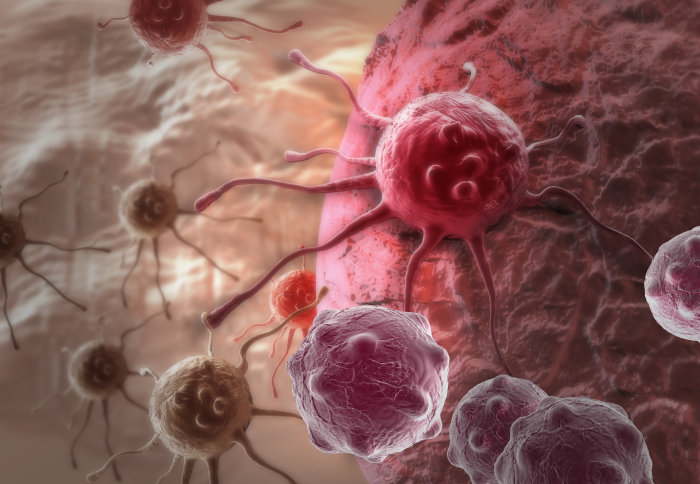Cancer drug discovery technologies get a £4.5m boost

Imperial academics will lead a project to improve imaging technologies for cancer drug discovery, funded by CRUK and European partners.
The funding is part of the Cancer Research UK Accelerator Awards programme, which provides five years of funding for international projects.
The £4.5m project will be led by Professor Paul French from the Department of Physics at Imperial, with collaborators across the Faculties of Natural Sciences and Medicine, and partners in the Francis Crick Institute, the University of Edinburgh, the Institute of Cancer Research and the Instituto de Recerca Biomedica in Barcelona.
More realistic cancer models
The project aims to improve screening for new cancer drugs. Currently, drugs are typically tested using conventional microscopy to image thin layers of cancer cells. However, this approach does not reflect the true complexity of cancer inside people.
By developing technology to investigate more sophisticated 3D cancer models, which allow us to explore how drugs work on tumour cells interacting with their local environment, we could find new ways to overcome challenges like drug resistance. Professor Paul French
The cancerous cells in tumours interact with ‘normal’ cells in the surrounding tissue, and, while the majority may be killed by chemotherapy drugs, not all the cancerous cells in a tumour behave the same way. A small minority find ways to survive and these can cause the cancer to recur. Current drug screens typically measure the ‘average’ behaviour of cells, so may miss these outliers.
More realistic 3D models of tumours, made of different cell types that better reflect the complexity inside patients, can provide vital information about how the different cells respond to a potential new drug, but these 3D cell cultures are more difficult to image as they are more complex and opaquer.
Professor French and the team are developing technologies that can more accurately image these more realistic cancer models, enhancing our understanding of how drugs effect all cell behaviours and improving outcomes for patients.
Professor French said: “The complexity of cancer is beyond our current understanding and existing therapies. By developing technology to investigate more sophisticated 3D cancer models, which allow us to explore how drugs work on tumour cells interacting with their local environment, we could find new ways to overcome challenges like drug resistance.”
The new techniques could be used to discover drugs that work with currently resistant cancers, and to help understand how cancer cells can interact with surrounding cells to evade drug treatments.
Maintaining strong collaborations
The award to Imperial is part a £27.4 million investment by Cancer Research UK and its European partners, Fondazione AIRC and Asociación Española Contra el Cáncer (AECC), into seven new international projects to accelerate lifesaving cancer research.
Dr Iain Foulkes, executive director of research and innovation at Cancer Research UK, said: “If current trends continue, the world will see a 60 percent increase in cancer cases over the next two decades. Cancer is a global problem and no one country can tackle it alone.
“Now the UK has left the European Union, the need to retain collaborative cancer research between the EU and the UK has never been greater. This partnership will also strengthen UK cancer research by the sharing of expertise, new technologies and research talent.”
The project led by Imperial is also part of the new CRUK Convergence Science Centre, a partnership between Imperial and the Institute of Cancer Research. The Centre aims to bring together engineers and physical scientists with cancer researchers to develop new tools and technologies to address unmet needs in cancer.
Article supporters
Article text (excluding photos or graphics) © Imperial College London.
Photos and graphics subject to third party copyright used with permission or © Imperial College London.
Reporter
Hayley Dunning
Communications Division